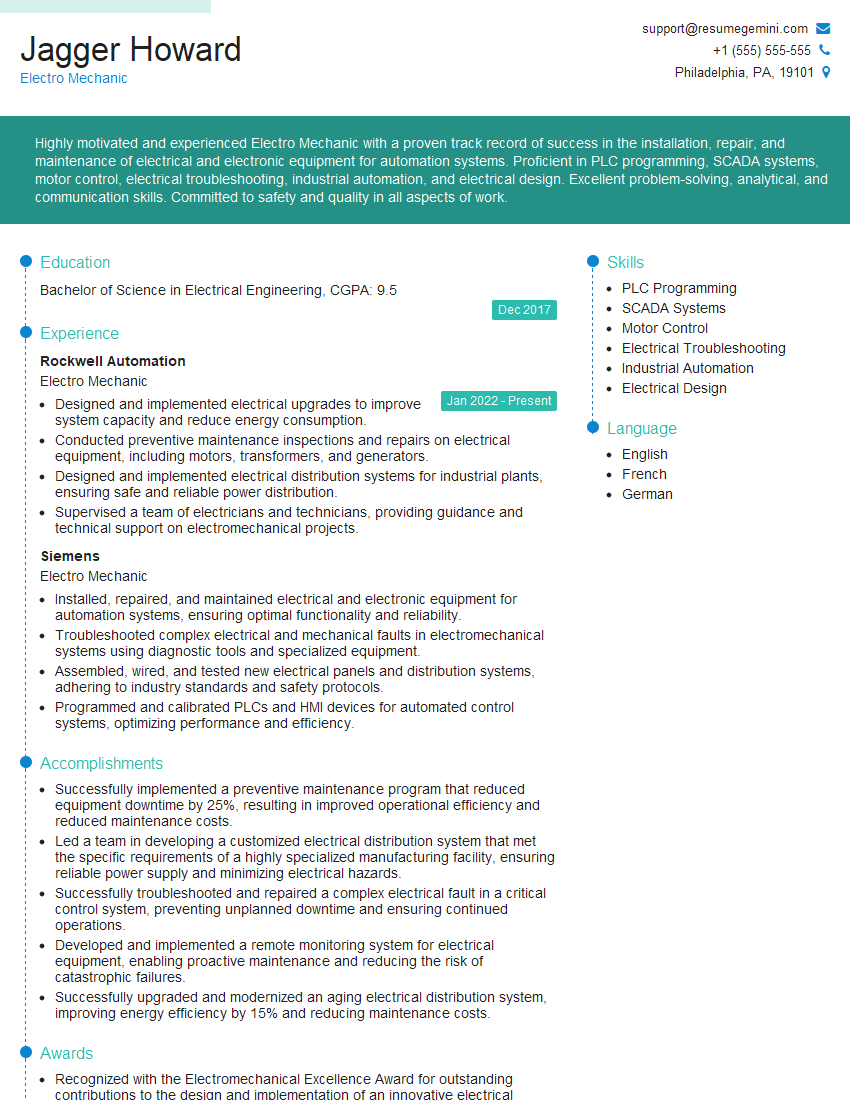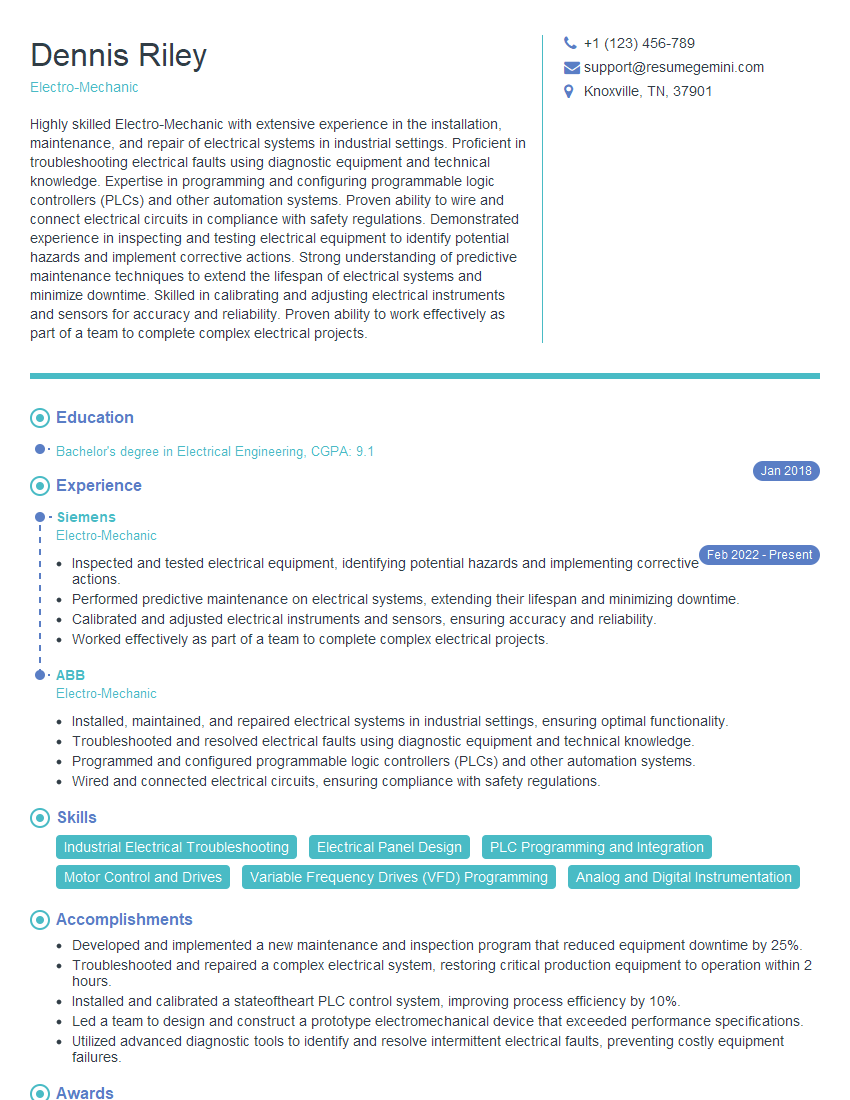Are you gearing up for a career shift or aiming to ace your next interview? Look no further! We’ve curated a comprehensive guide to help you crack the interview for the coveted Electro Mechanic position. From understanding the key responsibilities to mastering the most commonly asked questions, this blog has you covered. So, buckle up and let’s embark on this journey together.
Acing the interview is crucial, but landing one requires a compelling resume that gets you noticed. Crafting a professional document that highlights your skills and experience is the first step toward interview success. ResumeGemini can help you build a standout resume that gets you called in for that dream job.
Essential Interview Questions For Electro Mechanic
1. Explain the working principle of a three-phase induction motor.
- A three-phase induction motor consists of a stator and a rotor.
- The stator has three windings that are connected to a three-phase power supply.
- When the power supply is turned on, the stator windings create a rotating magnetic field.
- The rotating magnetic field induces currents in the rotor windings, which cause the rotor to rotate.
2. How do you test the insulation resistance of an electrical motor?
Megger Test
- Disconnect the motor from the power supply.
- Connect the megger to the motor terminals.
- Apply a voltage to the motor terminals and measure the insulation resistance.
High-Voltage Test
- Disconnect the motor from the power supply.
- Apply a high voltage to the motor terminals.
- Measure the current flowing through the motor.
3. What are the different types of electrical faults that can occur in an electrical motor?
- Ground faults
- Short circuits
- Open circuits
- Arcing faults
4. How do you troubleshoot an electrical motor that is not running?
- Check the power supply.
- Check the motor connections.
- Check the motor windings.
- Check the motor bearings.
5. How do you maintain an electrical motor?
- Regularly clean the motor.
- Lubricate the motor bearings.
- Check the motor connections.
- Test the motor insulation resistance.
6. What are the safety precautions that must be taken when working on electrical motors?
- Lock out and tag out the motor.
- Wear appropriate personal protective equipment.
- Use insulated tools.
- Follow all safety procedures.
7. What are the different types of electrical motors?
- AC motors
- DC motors
- Synchronous motors
- Induction motors
8. What is the difference between a synchronous motor and an induction motor?
- Synchronous motors run at a constant speed, while induction motors run at a speed that is slightly less than the synchronous speed.
- Synchronous motors require a DC power supply, while induction motors can run on either AC or DC power.
- Synchronous motors are more efficient than induction motors.
9. What is the purpose of a capacitor in an electrical motor?
- Capacitors are used in electrical motors to improve the power factor.
- Power factor is a measure of how efficiently an electrical motor converts electrical energy into mechanical energy.
- Capacitors help to reduce the amount of reactive power that is drawn by the motor.
10. What is the difference between a single-phase motor and a three-phase motor?
- Single-phase motors are used for small appliances, such as fans and pumps.
- Three-phase motors are used for larger applications, such as industrial machinery and pumps.
- Three-phase motors are more efficient than single-phase motors.
Interviewers often ask about specific skills and experiences. With ResumeGemini‘s customizable templates, you can tailor your resume to showcase the skills most relevant to the position, making a powerful first impression. Also check out Resume Template specially tailored for Electro Mechanic.
Career Expert Tips:
- Ace those interviews! Prepare effectively by reviewing the Top 50 Most Common Interview Questions on ResumeGemini.
- Navigate your job search with confidence! Explore a wide range of Career Tips on ResumeGemini. Learn about common challenges and recommendations to overcome them.
- Craft the perfect resume! Master the Art of Resume Writing with ResumeGemini’s guide. Showcase your unique qualifications and achievements effectively.
- Great Savings With New Year Deals and Discounts! In 2025, boost your job search and build your dream resume with ResumeGemini’s ATS optimized templates.
Researching the company and tailoring your answers is essential. Once you have a clear understanding of the Electro Mechanic‘s requirements, you can use ResumeGemini to adjust your resume to perfectly match the job description.
Key Job Responsibilities
Electro Mechanics are responsible for a wide range of tasks related to the maintenance and repair of electrical and mechanical systems. Some of their key responsibilities include:
1. Electrical System Maintenance and Repair
Electro Mechanics are responsible for maintaining and repairing electrical systems in a variety of settings, including industrial, commercial, and residential buildings. Their duties may include:
- Installing, repairing, and maintaining electrical equipment, such as motors, generators, transformers, and switchgear
- Troubleshooting electrical problems and rectifying them
- Testing and inspecting electrical systems to ensure safety and reliability
- Rewiring electrical systems as needed to meet new electrical codes or requirements
2. Mechanical System Maintenance and Repair
Electro Mechanics are also responsible for maintaining and repairing mechanical systems, such as pumps, compressors, fans, and blowers. Their duties may include:
- Installing, repairing, and maintaining mechanical equipment
- Troubleshooting mechanical problems and rectifying them
- Testing and inspecting mechanical systems to ensure safety and reliability
- Rebuilding and overhauling mechanical systems as needed
3. Preventative Maintenance
Electro Mechanics play an important role in preventative maintenance by performing regular inspections and tests on electrical and mechanical systems. This helps to identify potential problems before they become major issues, which can save time and money in the long run.
4. Emergency Response
Electro Mechanics are often called upon to respond to emergency situations, such as power outages or equipment breakdowns. They are responsible for quickly assessing the situation and taking the necessary steps to restore power or repair the equipment.
Interview Tips
Interviewing for an Electro Mechanic position can be challenging, but there are a few things you can do to improve your chances of success:
1. Research the Company and the Position
Before you go on an interview, take the time to research the company and the position you are applying for. This will help you to understand the company’s culture and values, and to tailor your answers to the specific requirements of the position.
2. Prepare for Common Interview Questions
There are a few common interview questions that you are likely to be asked, such as “What are your strengths and weaknesses?” and “Why do you want to work for this company?” Prepare your answers to these questions in advance so that you can deliver them confidently and concisely.
3. Be Enthusiastic and Professional
Employers are looking for candidates who are enthusiastic about their work and who are professional in their demeanor. Make sure to show your interest in the position and the company, and to answer questions in a clear and concise manner.
4. Follow Up
After the interview, send a thank-you note to the interviewer. This is a great way to reiterate your interest in the position and to show your appreciation for their time.
Next Step:
Now that you’re armed with interview-winning answers and a deeper understanding of the Electro Mechanic role, it’s time to take action! Does your resume accurately reflect your skills and experience for this position? If not, head over to ResumeGemini. Here, you’ll find all the tools and tips to craft a resume that gets noticed. Don’t let a weak resume hold you back from landing your dream job. Polish your resume, hit the “Build Your Resume” button, and watch your career take off! Remember, preparation is key, and ResumeGemini is your partner in interview success.

